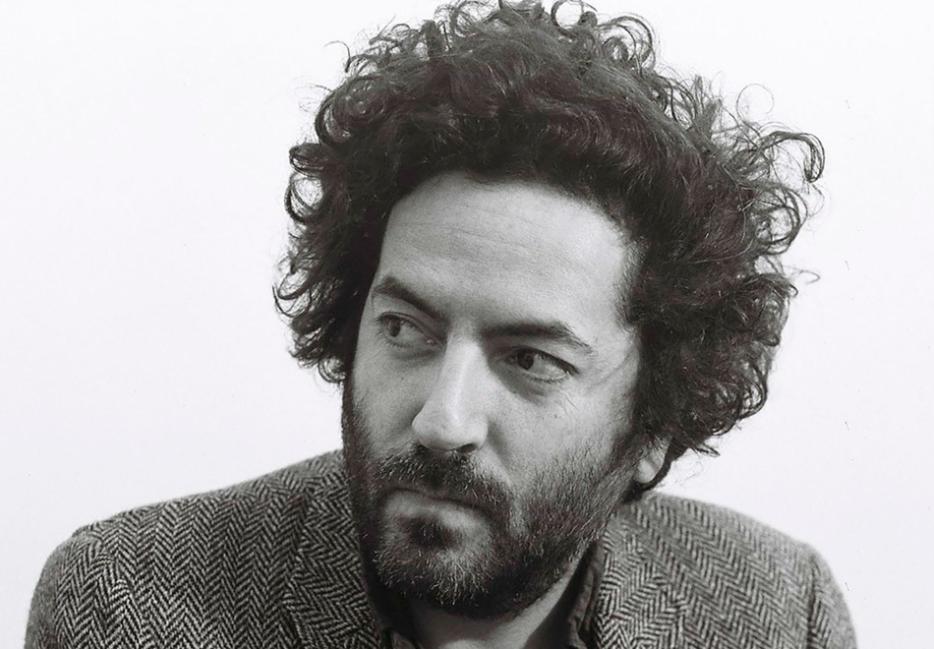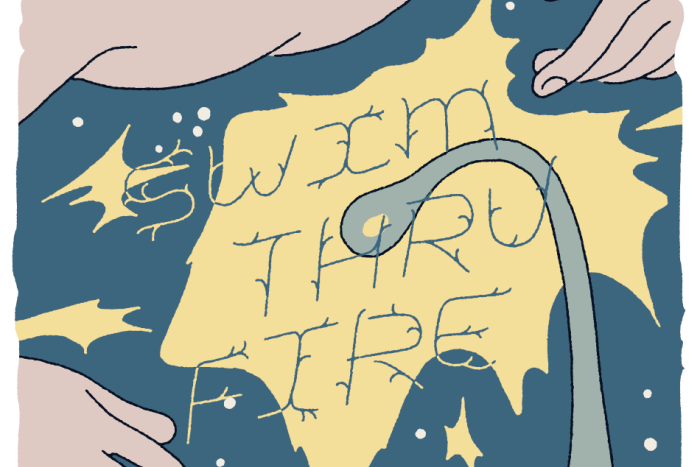In rock music, destruction comes in many forms. There’s Iggy Pop’s scorched-earth “Search and Destroy;” the ribald excess of Kiss’s Destroyer; the Soft Boys’ melodious “I Wanna Destroy You.” Then there’s Dan Bejar, the protean singer-songwriter who, for almost twenty years now, has gone by the puzzling moniker of Destroyer.
When you think of Bejar’s music, mass carnage is hardly what comes to mind—even if his acerbic wit and anthemic bent can make for an unexpected kind of violence that amounts to an intellectual gut punch. Yet the Vancouver indie-savant is constantly dismantling and reinventing his music, from the charged folk-rock of 2000’s Thief and 2001’s Streethawk: A Seduction to 2004’s synth-opus Your Blues and the steely blue-eyed soul grooves of 2010’s surprise hit Kaputt.
The forthcoming Poison Season recasts the 42-year-old Bejar yet again, this time through a series of slow-burning ballads largely inspired by the Great American Songbook and golden-throated crooners—albeit with some oddball touches to remind you that even in the midst of creation or formation, Destroyer never fails to live up to its name. As usual, no one can explain the album better than Dan Bejar himself. And in keeping with his uneasy, lightly mysterious persona, even for Bejar dissecting Poison Season is its own kind of adventure.
*
I wanted to ask you about “Dream Lover,” since that was the first thing I heard from the record. The line “I think I used to be more fun” really stuck with me.
That’s kind of the crux of the whole song.
Maybe it was wishful thinking on my part, but I really believed that might inform the entire record.
I find “Dream Lover” pretty strange. It seems to stand apart from the other songs on the record. It’s pretty ratty, you know? But I think that middle break in the song is like a curtain that parts, because most of the rest of it is just the band kind of blasting through. There’s a certain amount of bravado in the presentation of the song, even though I think it’s mostly a song about, I don’t know, sickness, really [laughs]. And kind of a pep talk for people in the grip of decay, you know? It’s not really a song I recognize myself in all that much but I thought that’s kind of why I like that one little line that peeks out. You know, it’s kind of a joyous, miserablist song. There’s something so loud, yet so decrepit about it.
I thought it was going to be a centerpiece of Poison Season but it ended up as an outlier.
Yeah, I think, as far as the album goes, it kind of had to come out of the gates strong, especially after the introduction of the initial, classical motif of “Times Square.” I just wanted something that blasted forward. I thought it was a novelty song. Then it came out just way louder and way more rock than I ever intended. We maybe practiced it twice and took two stabs at recording it at the very end of the session. It kind of just busted loose. But there’s kind of a sneering quality to the vocals, which I like a lot and which is different from a lot of the other singing going on [on Poison Season]. There wasn’t too much work done on it, which is generally a good sign.
Outside of “Dream Lover,” there’s this feeling of deliberation. There’s nothing casual or off-the-cuff about the way this record presents itself.
I carried the songs around with me for a long time. I kind of stewed on [them] for a bit; I’m not really used to living with songs for that long. In my head, they kind of wavered in form before I even got to the point of trying to sing them. That’s one thing I’m always careful not to do: sing songs before I get into the studio. I want them to be as live as possible, you know? That was a real conflict with the musical traditions I was thinking of here. But even though the music seems to insist on a certain level of grandeur, the actual songs themselves, and the singing, are more composed of these small, intimate, questioning moments.
I have to ask: Have you mellowed with age?
Looking back, I think I was very confident making records before. They definitely seem harder and harder the more I make them. With records like This Night or Your Blues, I just kind of lucked into them. That’s good, that’s exciting. There’s also this rush that I would get from images and words kind of pouring out onto themselves, and my voice is trying to keep up with them. And that is over, those days are done. I feel like there is always, in my mind, a sort of confrontation between the words and the music, or the singer and the band, and I’m not really that interested in that element now.
Let’s face it, my voice, as gently as I might want to croon, still sucks, and the words, even though I don’t write as much as I used to … it’s not like I’m spitting out these things in the same way, they’re still weird. As a genre workout, it’s a failure.
Poison Season is musical in a different way than everything else you’ve done. It’s very musical in the old-school sense.
Yeah, I think so. I think Poison Season’s got a real twentieth-century vibe. My touchstones haven’t really changed too much. I’m still listening to Richard Harris and The Style Council [like I was with Your Blues]. I had been just doing really quick sneak attacks on that kind of aesthetic, but never thinking of myself truly in that tradition. At this point, I posit myself one hundred percent in the tradition of a Richard Harris or a Paul Weller. But none of that shit’s really changed. I mean, maybe I listened to Scott Walker more back when I was making Your Blues, and through Scott Walker, I discovered Sinatra, in my typical backwards way. It’s me going into classicist mode and just finally immersing myself in this version of American music.
Don’t take this the wrong way, but is Poison Season the indie rock version of a standards record?
As a move for a singer-songwriter in his early- to mid-forties or whatever, it couldn’t be more hack. It couldn’t be more basic [laughs]. It’s totally Aging Rocker 101, but that’s not a good enough reason for me not to do it. After I got off the road from Kaputt, I got really, really obsessed with the song “Mack the Knife.” The first thing I wanted to do was cover it. When I listen to Poison Season, I feel like it’s so obvious that I was obsessed with that song and different recordings of it.
I was literally just about to bring up Kurt Weill.
By the way, I didn’t mean to call you old. You’ve just progressed your sound in a way that not many of your peers have. There’s no playbook for indie rock middle-age in the same way there was for previous generations of musicians.
It seems like it’s a lot different being an aging classic rocker. The aging indie rocker is kind of a different scene [laughs]. I think you’re supposed to kind of just slowly fade out. There’s no, like, tragic falls, really, or people who want great records making just terrible records. It’s just more that you just become less relevant or less spoken of, you know? But in the end, it seems something very independent from the record that you make. At some point, in the last five years, I realized that what I do is I do show business, which is a different version of Destroyer from the one that came before it—when I thought I was somehow attacking all of those things.
Attacking … show business?
Yeah, attacking that, attacking all of the things that I didn’t like. I thought that Destroyer was an attack on show biz [laughs], even though I was as much of a song and dance man as anyone else. And the songs, when you boil them down, are very much traditional pop songs or traditional folk-rock songs. There’s nothing too revolutionary about the music. It’s more of this attitude of like a pamphleteer. I’ve never done too much more than just write about what I have at hand, or whatever my scene happens to be. That was never really my ideal of writing or art-making. It’s always something more elevated than that. I’d rather just capture the way the light dances on the water, right?
Do you think you’re doing that more now?
I hope so. I mean, if you say “I hope so,” it means you’re probably not. But I feel like the music’s less agitated in some ways. At the same time, it seems to be a much darker and much more foreboding record than any Destroyer album I can think of. When I listen to it, even though the sounds are very lush, I feel like there’s a sense of dread in the record, and a sense of someone lost in the world. It feels more real than other Destroyer albums.
I mean, you did call it Poison Season.
I do wonder what people who don’t have the historical references are going to make of this record.
I don’t really know. I mean, I can’t really say that I’ve thought about it. I think the last Destroyer record was kind of a strange crossover moment. In an accidental way, I made a record at the age of 39 or 40 where I seemed to line up with what is, from what I can tell, a certain, weird zeitgeist that went down in 2011. And it’s not like this record is a rejection of that, but I think it’s more me really going along a course where I’ve always been going along. I can’t imagine this record really having too much appeal to casual listeners.
Someone who reveres the stuff I had in mind when I was making [Poison Season] will probably despise this record. Because, let’s face it, my voice—as gently as I might want to croon—still sucks, and the words—even though I don’t write as much as I used to … it’s not like I’m spitting out these things in the same way—they’re still weird. As a genre workout, it’s a failure. Even within specific songs, very fucked up things butt heads—there’s a song, “Hell,” that’s a Michael Nyman-style chamber quartet that then kind of goes into a refrain, like a kind of end-chorus, that’s essentially like a Salvation Army version of Sinatra at the Sands, or maybe just full-on talk show walk-on music.
A lot of it was accidental because for all of the meticulousness of making the record, it was done in a super-bizarre way where the person who was writing the arrangements and the band that was recording the songs didn’t really have any idea of what each other were doing. And they all kind of took the songs in these different directions, and in the end, the sounds kind of just got heaped onto the songs. And we tried to find a path through all of it that made sense. In that sense, that’s a very Destroyer way of working. I had no idea what it was going to sound like. But in the end I realized it was going to be much more of a fusion of different things that I only had half-control over instead of it being like some kind of perfect, twilight Nelson Riddle record.
The reality is that a lot of the older records were just me ranting in a notebook.
I could ask you about the whole concept/cohesiveness of it, but I will be totally honest, I don’t think I’ve really gotten to the bottom of it.
You would probably be able to tell about twenty seconds in that I had no idea what the hell I was talking about. I would just be making it up as I go along, so I don’t know, it sounds like you’ve got my number.
Well, the press release they sent me digs into it pretty hard.
I think it was mostly based around some rambling email not even intended for a press release. When I finally got around to reading it, I didn’t really recognize [the record] that they’re talking about.
And in some ways, Destroyer has always been as much about how words sound and feel as their literal meanings or linear progress.
The reality is that a lot of the older records were just me ranting in a notebook. Just, like, furious writings that I would then try to cram into some songs, and, you know, I would try and find what I would think would be the most melodious language in those rants, and they’d end up in a song, but it just does not happen that way anymore. Little phrases kind of just drift out of the air with melodies attached to them and there’s much more space between the words now, probably because there’s a difference in the way that I’m making songs. It’s more of a musical adventure than this kind of fucked-up literary project with music.
I’m assuming you want the press release stuff kept out, right?
Oh, no, I don’t give a shit. You really can write whatever you want.





